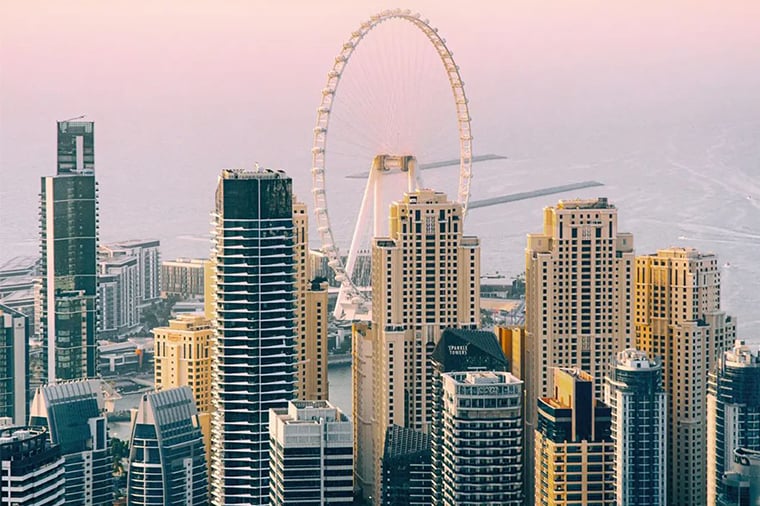Buying a property is a big decision! This is your one-stop guide to navigating the property sale search in Dubai.
Here, Farah Ali, real estate senior sales specialist at Espace uncovers everything you need to know – from understanding your finances to choosing the perfect location and property type. Let’s go over all the legalities and buying process to ensure you have a smooth experience.

What can you afford & the down payment required
If like most people you require a mortgage to purchase your home, an experienced mortgage advisor can offer you so much at this stage. Homeownership in Dubai requires a down payment of 20% (minimum for an expat) for a property under the value of AED 5,000,000 and anything above AED 5,000,000 will require a down payment of 30% (minimum for an expat). It is important to note that the Central Bank has set a mortgage cap for first-time buyers, allowing them to borrow up to seven times their salary. Additionally, there are several upfront costs involved in purchasing a home, including the real estate agent fee, Dubai Land Department fee, and mortgage processing fees.
You will be faced with many choices and the stage of your mortgage process and getting pre-approved. Should you choose a fixed or variable interest rate mortgage? How much can you borrow? How long will it take you to pay off the loan? Your independent broker is there to advise you on each of these issues.
Choose a location wisely before investing in a property
With your finances in place, it’s time to consider your search. How many bedrooms are you looking for, what size of property do you require and what communities are you looking to buy in. In the property world, it’s often said that your new home is the right combination of what you want, what you can afford and what is on the market. Whether you are looking for a detached villa with a garden and a pool or a skyline apartment, try to imagine living there. Is there a possibility your family needs will change in the coming years?
View this post on Instagram
Key location issues to consider before buying a property:
– Get to know your community– try and visit your chosen area at different times of the day and night. It’s also a good idea to visit at weekends when people are out and about.
– Schools, hospitals, sports clubs and community amenities – make a note of how well-serviced your new area is
– Are you in walking distance to the community pool, park of community centre?
– Other local amenities – what are the shops, supermarkets, restaurants, parks in the area like?
– Distance to and from work and family – how much time are you prepared to spend travelling to and from work every day.
What to choose: Secondary Properties or Off-plan?
Secondary properties provide immediate availability, established communities, and the opportunity to view the property before purchase. Conversely, buying off-plan offers the benefit of a phased payment plan, allowing buyers to make timely payments and maintain a healthy cash flow. However, a potential drawback is that the final product may not always align with the initial purchase agreement, with variations possible between signing the sales and purchase agreement and the actual handover.
Do you want a standard or turn-key property?
The prospect of renovating a house tends to divide opinion. For some, they want to control every element of the design/ layout, and everything will be just as you want. For others, enjoyment comes from the convenience and knowing your dream home is ready and waiting to be moved into, you can simply turn up with your removals van and move straight in.
It is important to note that each developer has their own rules and regulations regarding extensions. You will need to obtain an NOC from the developer, as well as approval from Dubai Municipality. Some communities are very strict about certain extensions and modifications, while others are more lenient. Additionally, if you are planning to do extensions, make sure to find out the costs involved, as prices vary from developer to developer based on the added square meters.
Do you need a vacant property, or do you have the option of viewing tenanted properties?
The urgency of your move will significantly influence your property search. If you have time on your side and don’t need to move immediately, you can consider viewing tenanted properties. However, if you need to move in as soon as possible, it’s essential to inform your agent so they can show you properties that are either vacant or will be available vacant upon transfer. Many UAE residents are currently facing this decision as they opt for homeownership to avoid rising rental prices.
Qualify your agent
We always recommend conducting thorough research on your real estate agent. Arrange a meeting and treat it like a short interview: inquire about their past sales in your desired area, their opinions on current prices, and whether they anticipate any increases or decreases. Despite the Dubai Land Department (DLD) and leading UAE property portals launching impressive initiatives to eliminate fake listings, it’s essential to remain cautious—if an offer seems too good to be true, it probably is.
View this post on Instagram
Understanding the buying process
Understand the next steps once you’ve made an offer; proceedings move swiftly in the UAE. Upon acceptance of your offer on a property, a contract can be drafted within a matter of hours. A common oversight among buyers is assuming that sellers will delay in responding to offers.
The contract is drafted by conveyancing officers, not lawyers
There’s a common misunderstanding among expats that lawyers draft property contracts, but in fact, conveyancers (often available in-house at most agencies) primarily oversee the purchase process.
Market Conditions
It’s important to thoroughly research and assess the market before buying a property. Consider all relevant factors: What are the average prices (AED/Sqft) and rental prices in the area, understand the last comparable sales to get an understanding of the price cycle in that community.
Understanding Property Service Charges
One of the expenses to consider is the service charge, covering the property’s maintenance and upkeep. The Dubai Land Department (DLD) offers prospective homeowners access to a Service Charge Index through their website or app.
– For more on luxury lifestyle, news, fashion and beauty follow Emirates Woman on Facebook and Instagram
Images: Feature Image: Instagram @dubai_photoconcierge











